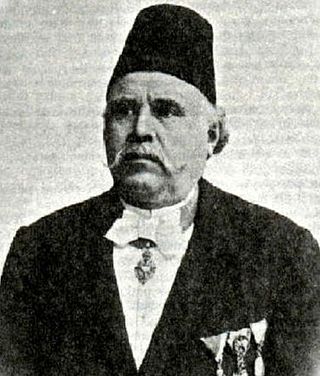Top Qs
Timeline
Chat
Perspective
Mehmed Kapetanović
Bosnian writer and public official From Wikipedia, the free encyclopedia
Remove ads
Mehmed-beg Kapetanović Ljubušak (19 December 1839 – 29 July 1902)[1] was a Bosnian writer and public official.[2]
Remove ads
Biography
Summarize
Perspective
The Kapetanović family originates from one of the branches of the Croat Catholic noble family of Cvitković-Zdilar from Imotski. His paternal ancestor Jozo Cvitković was involved in an uprising there and escaped to Ljubuški, where he converted to Islam and became Sulejman Bey Kapetanović. He briefly served as the replacement for the vizier of Bosnia after Namik Pasha was expelled and replaced by Ibrahim Pasha in 1831.[3]
Kapetanović's mother came from the notable Atlagić noble family of Livno, which produced several pashas and military commanders. From a young age, he studied Turkish, Arabic, and Persian, initially at a mekteb-i rüşdiye in Mostar, later deepening his knowledge under the scholar Mehmed ef. Krehić in Ljubuški.
At the age of 20, he became a member of the Medžlisi idare (administrative council) in his hometown. Shortly after, he was sent by his father to Grahovac as part of the Ottoman army under Çerkes Husein Pasha. During the Herzegovinian uprisings, he led local citizens and served for several months on the Montenegrin border under Derviš Pasha Lovčali. For his service, he was awarded a gold- and silver-adorned sword and a medal for bravery by the Sultan.[4]
Mehmed Kapetanović attended the madrasa in Ljubuški and studied oriental languages. Kapetanović arrived in Sarajevo in 1878, where he became the mayor in 1893, holding the office until declining health forced him to resign in 1899. He died in Sarajevo in 1902.
During the late 19th century, Kapetanović actively collected Bosniak folk treasures in Bosnia, Herzegovina, and neighbouring regions. He published several books, the most famous being Narodno blago (English: "The National Wealth") from 1887. In 1891, Kapetanović founded the influential political journal Bošnjak ("Bosniak"), which gathered several Bosniak intellectuals of its time.
Kapetanović became the mayor of Sarajevo in 1893 following the 1892 death of the first mayor Mustafa Fadilpašić. The most significant project during Kapetanović's governance was the delivery of electricity to the city. Specifically, on 1 May 1895, Sarajevo had electric lighting for the first time.[5][6][7] Until then, the street lights were oil lanterns. On that same day, Sarajevo became one of the first European cities to install electric tram-trains, replacing horse-drawn vehicles.
Kapetanović survived a stroke in July 1898. His health rapidly declined; by April 1899, he had stepped down as mayor. He died on 29 July 1902 at the age of 62. His son Riza-beg Kapetanović died 24 December 1931.
Remove ads
Main works
- Risale-i ahlak (Treatise on Morals, 1883)
- Sto misle muhamedanci u Bosni? (What Do Mohammedans in Bosnia Think?, 1886)
- Narodno Blago (The National Wealth, 1887)
- Boj pod Banjomlukom 1737 (The Banja Luka Battle, 1737, 1888)
- Budućnost ili napredak muhamedanaca u Bosni i Hercegovini (Future or Progress of the Mohammedans in Bosnia and Herzegovina, 1893)
Notes
References
Wikiwand - on
Seamless Wikipedia browsing. On steroids.
Remove ads

